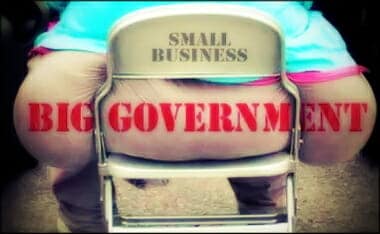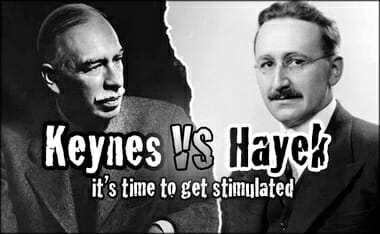- By a continuing process of inflation, governments can confiscate, secretly and unobserved, an important part of the wealth of their citizens. – John Maynard Keynes
Originally posted in October 2011 ~ Updated the media files
GATEWAY PUNDIT has this:
Two anti-Keynesians won this year’s Nobel Prize for Economics. Investor’s Business Daily reported:
Failed Policy: The Nobel Prize for Economics goes to two Americans who have separately exposed the flaws in government stimulus spending. For a Keynesian president, it’s the Anti-Peace Prize.
When President Obama was awarded the Nobel Peace Prize during his first year in office, detractors said it was for doing nothing.
That can’t be said for Thomas Sargent of New York University and Princeton’s Christopher Sims, whose macroeconomics work has been of invaluable help to central bankers and other economic policymakers, and for which they now share this year’s economics Nobel.
Sargent’s discoveries in particular echo the rationale Republican leaders in Congress have presented in opposing the massive Democratic stimulus spending during the first two years of the Obama administration — that such spending seeks to give the economy nothing more than what House Budget Chairman Rep. Paul Ryan over the weekend aptly called a “sugar high.”
This is an old accumulation of quotes via Bovard, Keynes, and Friedman regarding the “hidden tax”::
John Maynard Keynes hailed the Soviet Union in a 1936 radio interview as, And in a preface he wrote to the 1936 German edition of his General Theory of Employment, Interest, and Money, Keynes stated that his economic theory, The two above quotes are from James Bovard’s book, Freedom in Chains: The Rise of the State and the Demise of the Citizen, (New York, NY: St. Martin’s Press, 1999), 14, 20-21. Another Keynes quote lets the individual in on the result of his theories, which most nations use (i.e., central banking; e.g., the Federal Reserve Bank): “Lenin is said to have declared that the best way to destroy the capitalist system was to debauch the currency. By a continuing process of inflation, governments can confiscate, secretly and unobserved, an important part of the wealth of their citizens. By this method they not only confiscate, but they confiscate arbitrarily; and, while the process impoverishes many, it actually enriches some. The sight of this arbitrary rearrangement of riches strikes not only at security but [also] at confidence in the equity of the existing distribution of wealth. Those to whom the system brings windfalls, beyond their deserts and even beyond their expectations or desires, become “profiteers,” who are the object of the hatred of the bourgeoisie, whom the inflationism has impoverished, not less than of the proletariat. As the inflation proceeds and the real value of the currency fluctuates wildly from month to month, all permanent relations between debtors and creditors, which form the ultimate foundation of capitalism, become so utterly disordered as to be almost meaningless; and the process of wealth-getting degenerates into a gamble and a lottery. Lenin was certainly right. There is no subtler, no surer means of overturning the existing basis of society than to debauch the currency. The process engages all the hidden forces of economic law on the side of destruction, and does it in a manner which not one man in a million is able to diagnose.” John Maynard Keynes, The Economic Consequences Of The Peace (New York, NY: Harcourt, Brace, and Howe, 1920), 235-236 Milton Friedman quoted this in Money Mischief: Episodes in Monetary History:
This last quote IS what happens with Keynesian economics! An unseen taxation of citizens, on top of normal taxation.
Here is a good (as good as an economist’s presentation can be) presentation by Thomas Sargent:
Speaker: Professor Thomas J Sargent Chair: Professor Francesco Caselli
This event was recorded on 10 February 2010 in Old Theatre, Old Building
Combining an historical approach with macroeconomic theory, Thomas Sargent will discuss ways of thinking about American fiscal and monetary policies – exploring how contradictions have developed and how they have been resolved. Thomas Sargent is professor of economics at New York University and senior fellow at Hoover Institution at Stanford University.
More via ECONOMIC LIBERTY:
Thomas Sargent was awarded, along with Christopher Sims, the 2011 Nobel Prize in Economic Sciences. The Nobel committee cited their “empirical research on cause and effect in the macroeconomy.” The Swedish economists who spoke at the press conference announcing the award emphasized the importance of Sargent’s and Sims’ thinking about the role of people’s expectations.
Sargent was an early and important contributor to the rational expectations revolution in macroeconomics, an area for which his sometime collaborator, Robert E. Lucas, Jr. won the Nobel Prize in 1995. One of Sargent’s key early contributions, along with University of Minnesota economist Neil Wallace, was the “Policy-ineffectiveness proposition”—the idea that people’s expectations about government fiscal and monetary policy make it difficult for government officials to affect the macroeconomy in the ways they intend to. If, for example, people get used to the Federal Reserve increasing the money supply when unemployment rises, they will expect higher inflation and, thus, will adjust their wage demands higher. Therefore, the lower unemployment rate that the Fed was trying to achieve with looser monetary policy will not occur.
This conclusion was at odds with the Keynesian model, which dominated economic thinking from the late 1930s to the early 1970s. The Keynesian model posited a stable tradeoff between inflation and unemployment. In 1970, major U.S. econometric models, built on Keynesian assumptions, predicted that the government could get the unemployment rate down to 4 percent if it accepted an increase in inflation to 4 percent. In a 1977 article, “Is Keynesian Economics a Dead End?” Sargent wrote: “[I]nstead of 4-4, in the mid-1970s we got 9-9, a very improbable occurrence if econometric models of 1969 had been correct.”
In the 1980s, Sargent explored expectations in other contexts. Sargent and Wallace argue in their highly influential paper, “Some Unpleasant Monetarist Arithmetic,” that good monetary policy requires good fiscal policy. Building on this, Sargent detailed how a government can end high inflation in “The Ends of Four Big Inflations.” Sargent studied four countries that had hyperinflation in the early 1920s: Germany, Austria, Hungary, and Poland. All used inflation to finance high government deficits. They all succeeded in eliminating hyperinflation, but to do so, they had to be credible. They had to affect people’s expectations by committing to substantially lower budget deficits or even balanced budgets. All four governments did so.
Sargent is actually quite ecumenical. In a 2010 interview, Sargent praised articles by left-wing economists Joseph Stiglitz and Jeffrey Sachs. Stiglitz and Sachs, he pointed out, “executed a rational expectations calculation to compute the rewards to prospective buyers” of toxic assets under President Obama’s Public-Private Investment Program of 2009. “Those calculations,” said Sargent, “showed that the administration’s proposal represented a large transfer of taxpayer funds to owners of toxic assets.”
Although the Nobel committee did not cite his work on unemployment insurance, Sargent, with Swedish economist Lars Ljungqvist, found that high, long-lasting unemployment benefits in Europe have caused many European workers who lost their jobs to stay unemployed for years and, thereby, erode their human capital. This makes them less employable in the long run. The fact that the U.S. government extended unemployment benefits in many U.S. states to 99 weeks, said Sargent in the 2010 interview referenced earlier, “fills me with dread.”
One of the main ways that Sargent has had influence is through his many, many students. An image of the students he has influenced, with Sargent in the middle of a flower, is worth a thousand words.
Thomas Sargent earned his B.A. from the University of California, Berkeley in 1964 and his Ph.D. from Harvard in 1968. He taught at the University of Pennsylvania from 1970 to 1971, the University of Minnesota from 1971 to 1987, the University of Chicago from 1991 to 1998, and Stanford University from 1998 to 2002. In 2002, Sargent began teaching at New York University, where he has since remained. Sargent was a Research Associate for the National Bureau of Economic Research From 1970 to 1973, and has been again from 1979 to the present. Between 1971 and 1987, Sargent was an Advisor to the Federal Reserve Bank of Minneapolis. He has been a fellow of the Econometric Society since 1976, a member of the National Academy of Sciences and American Academy of Arts and Sciences since 1983, and a senior fellow at the Hoover Institution since 1987. He was President of the American Economic Association in 2007.
About the Author
David R. Henderson is the editor of The Concise Encyclopedia of Economics. He is also an emeritus professor of economics with the Naval Postgraduate School and a research fellow with the Hoover Institution at Stanford University. He earned his Ph.D. in economics at UCLA.













